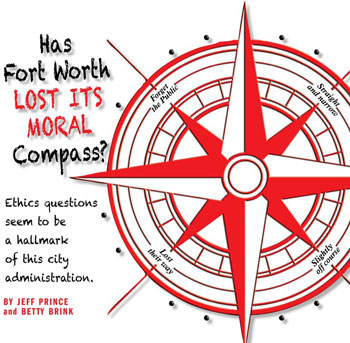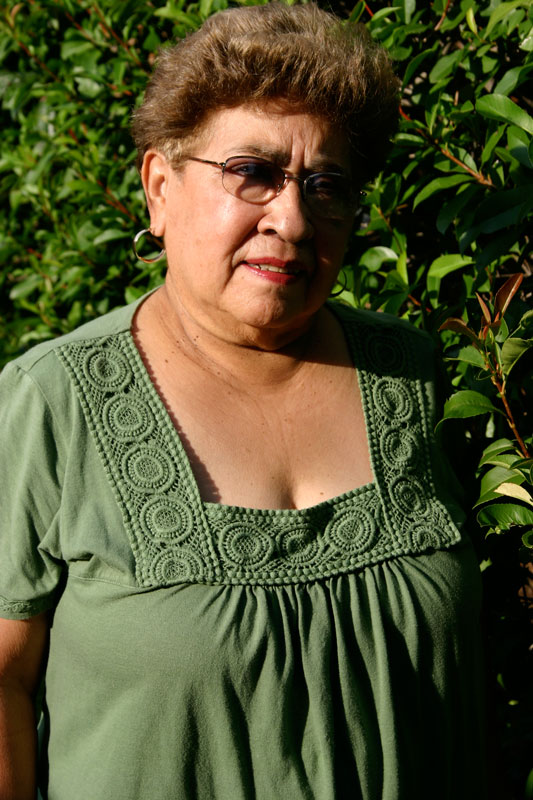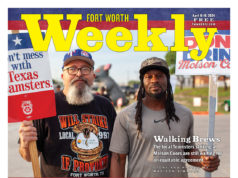Politics is a messy game — you need a playbook when you’re spending more than a billion dollars a year, making rules that affect the lives of nearly a million people, and balancing neighborhoods and business interests. Without rules, the victors always get the spoils, might and money are always right, and ethical lines fade.
 If you think that last sentence sounds a lot like what has been happening in Fort Worth lately, you’re not alone. Many local civic and neighborhood leaders believe this city’s ethical lines are not so much fading as being actively erased and moved around in some cases.
If you think that last sentence sounds a lot like what has been happening in Fort Worth lately, you’re not alone. Many local civic and neighborhood leaders believe this city’s ethical lines are not so much fading as being actively erased and moved around in some cases.
Take what happened recently when the normally languid city’s Ethics Review Committee unanimously upheld a complaint brought to them.
A resident complained about the city council putting gas industry executives on an air-quality task force. Allowing drillers to make crucial decisions on how the city’s air quality is tested at drill sites appeared to be a conflict of interest clearly forbidden by the city’s ethics code. The independent ethics panel agreed.
So how did the Fort Worth City Council, led by Mayor Mike Moncrief, respond?
They killed the messengers, scorned the resident who made the complaint, and fired the ethics panelists.
“They have no shame,” said Hortencia Laguna, 78, who had been president of the committee for years, until Moncrief dumped her.
City leaders thanked the gas execs for serving on the task force and vowed to change the ethics code to allow industry insiders to participate as voting members on future boards. Then Moncrief appointed new members, including a couple of his friends, as the new ethics committee — possibly in violation of the current rules on how the committee is to be chosen.
This is all scary stuff to city hall watchers, such as North Central Texas Communities Alliance president Esther McElfish, who says de-fanging the ethics committee and watering down the city’s code is no way to respond to accusations of shady ethics.
“The very nature of how they handled this speaks to how much we really do need an ethics committee,” she said. “Politics clouded the issue. It left a horribly bad taste in everybody’s mouths.”
Contrast that with what happened when the son of a city council member violated conflict-of-interest rules set by the federal government. In essence, Daniel Payton Scarth, 23, son of council member Danny Scarth, applied for and received financial help from the U.S. Department of Housing and Urban Development — routed through Fort Worth city government — to cover the down payment and closing costs on a home, under a program intended to help low-income citizens.
 HUD rules say that when a jurisdiction like Fort Worth distributes federal housing funds, neither elected officials of that city nor their family members may receive any financial benefits from those programs. In this case, Payton Scarth received $8,500 from the city’s federally funded HOME program, to help him purchase a townhouse near his father’s house in Woodhaven, on the East Side.
HUD rules say that when a jurisdiction like Fort Worth distributes federal housing funds, neither elected officials of that city nor their family members may receive any financial benefits from those programs. In this case, Payton Scarth received $8,500 from the city’s federally funded HOME program, to help him purchase a townhouse near his father’s house in Woodhaven, on the East Side.
As soon as HUD officials figured out the relationship of the two Scarths, they demanded that the city repay the sum from nonfederal funds, which the city has done, and required the city to promise in writing to change its procedures to keep similar problems from happening in the future. Payton Scarth, in turn, has reimbursed the city. (He could not be reached for comment.)
But his father, in an e-mail to Fort Worth Weekly, said he was not aware of the HUD conflict-of-interest regulation even though the councilman himself has been involved for years in working with other federally funded housing programs, including HOME. He laid the blame at the feet of the city housing staff, which, he said, had the responsibility to make it clear that his son was not eligible for HUD help due to the conflict of interest.
Further, he said, what happened wasn’t a problem under the city’s ethics ordinance, because his son didn’t get any special benefit that other applicants couldn’t also have gotten.
Scarth has faced his own ethical controversies. Before being elected to the council, he served on the city’s first gas drilling task force, which advised the city council on how to regulate urban drilling. Then Scarth accepted thousands of dollars from the gas industry to fund his city council campaign and rode to victory with the help of a Moncrief endorsement.
Meanwhile, the resident who filed the recent complaint against the gas executives has filed another complaint that accuses Scarth of misconduct for failing to abstain from voting on certain gas drilling issues despite the fact that he has profited from leasing his property to drillers.
Scarth’s and Moncrief’s actions drew criticism from civic leaders, who are increasingly critical of Fort Worth city government on ethical and other grounds. Moncrief showed little interest in the ethics panel until it made a decision that he disagreed with.
Former city council member Clyde Picht recalled asking Moncrief to strengthen the long-neglected ethics panel shortly after the mayor was first elected in 2003.
“He chose to ignore my advice and ignore the ethics issues,” Picht said. “Funny thing, he told me, ‘Nobody can challenge my ethics.’ I’m sure he thinks that, but we can all challenge his ethics. It’s not for him to decide which parts of the code we adhere to or ignore.”
Picht remembered the mayor telling him something else seven years ago: “Moncrief said the ethics commission can be a two-way sword. He meant if you’re unethical it can come back to hurt you. At least that’s the message I got.”
The five newly appointed members of the Ethics Review Committee will meet for the first time on Friday. The four who spoke with the Weekly said they are unbiased and under nobody’s thumb. With the new complaints and potential ethics code revisions waiting for them at Friday’s meeting, they’ll have an immediate opportunity to demonstrate their independence.
The mayor’s and council’s handling of the Ethics Committee, when it roused itself and upheld the charge against the gas industry executives, is interesting at each step along the way.
First, when the gas executives appealed the committee’s decision, the council chose not to consider that appeal at its regular weekly meeting, when a crowd of citizens in attendance on many matters could be expected. Instead they scheduled a special meeting on Aug. 19. And even though Moncrief spoke that day with the three panel members — the Rev. W.G. Daniels, Rebecca Lucas, and committee president Laguna — he didn’t mention the appeal hearing. Lucas and Laguna said they received no official word that the hearing had been scheduled. Daniels, who had major surgery recently, was unavailable for comment.
The ethics panel is supposed to consist of five members, but over the years, two had dropped out. The terms of Daniels, Lucas, and Laguna had long since expired. The ethics code restricts them to six years. But city officials had paid little attention to the panel over the years, so the members kept serving indefinitely. They were replaced only after they voted against the gas drillers.
On the morning of the appeal hearing, the two women’s conversations with Moncrief were about the fact that he was going to make new appointments.
“There was no choice offered,” said Lucas, who had served on the committee for about 20 years. “The timing speaks for itself.”
Laguna said Moncrief didn’t even explain that he was replacing her, but just mentioned the other people he was adding to the board.
 Meanwhile, Jim Ashford, the retired advertising executive who had filed the complaint against the gas drillers, was trying unsuccessfully to get City Attorney David Yett to discuss procedures for the hearing. Yett had pushed for a streamlined hearing process, he had earlier told Ashford, because the council was so busy with budget negotiations.
Meanwhile, Jim Ashford, the retired advertising executive who had filed the complaint against the gas drillers, was trying unsuccessfully to get City Attorney David Yett to discuss procedures for the hearing. Yett had pushed for a streamlined hearing process, he had earlier told Ashford, because the council was so busy with budget negotiations.
According to the meeting’s agenda, Ashford was to explain his complaint, followed by the gas executives’ attorney defending their position. Ashford wanted a chance to rebut whatever the gas execs’ attorney said. And he wanted Scarth and council member Jungus Jordan to recuse themselves from voting on the appeal because of the mineral leases they had signed with drillers.
“They have substantial interest in XTO and Chesapeake Energy,” Ashford said. He also had another reason for asking them to abstain: He has filed ethics complaints against both of them for not recusing themselves on earlier drilling-related votes, and the cases haven’t been settled. “It would be logical for there to be a prejudice against me by them,” he said.
Yett didn’t respond to Ashford’s e-mailed requests. And on the day of the hearing, Ashford was given no chance for rebuttal.
On Aug. 19, the city attorney began by giving city council members an overview of Ashford’s complaint. Just because the ethics committee cited a violation didn’t mean one actually existed, he told them. He also ruled that Jordan and Scarth could vote on the appeal.
After Ashford and the gas executives’ lawyer explained their positions, the council discussed the situation publicly for about an hour. Council member Carter Burdette read a portion of a city ordinance that he said allowed the gas execs to serve on the air-quality committee and exonerated them from conflict of interest charges.
“A person does not have a substantial interest in a business entity if the person has been designated by the city council to serve on such board,” Burdette read. That clause, indeed, makes it seem that if the council chose someone to serve on a board, that person would automatically be deemed to have no conflict — a blanket amnesty for everyone on any city board.
But Burdette had read only one part of the section of the ethics ordinance dealing with conflicts of interest. The full text of that section, in fact, says that the “no-conflict” provision applies only if several conditions are met. And the gas executives didn’t appear to meet those other conditions. What’s more, the gas company representatives did seem to meet the criteria in the code for having a financial interest in a business that could be construed as “in conflict with the proper discharge of his duties in the public interest.” In this case, Ashford and the ethics panel determined, the gas executives were being paid by companies that had a vested interest in the air-quality testing criteria.
“Mr. Burdette testified and presented false information when he failed to read the entire section,” Ashford said afterward. “I felt like my civil rights were violated. I should be entitled to a fair hearing. There was nothing fair about it. They steamrolled over me.”
Burdette, an attorney with extensive oil and gas industry experience, was asked this week if he purposely left out the other provisions when reading aloud the code during the appeal hearing. He said he couldn’t remember how the code was written in its entirety or if he omitted part of the provisions. “It’s possible I might have misread it,” he said. “I wasn’t trying to put out something that was misleading or different than what the code requires.”
He went on to say that when the city council appoints people to boards, knowing full well of their appointees’ connections to a particular industry, that should remove any questions of a conflict of interest, no matter what the current ethics code says. Based on their discussion during the appeals hearing, the rest of the city council members appear to agree. They are asking the new ethics panel to consider code revisions.
The city’s ethics code was passed in 1977 and modeled after the state ethics code. Back then Mayor Hugh Parmer described the city code as “an essential part of the people’s right to know about those who serve them in public office.”
In fact, the ethics committee reviewed and followed the whole ethics ordinance in making its decision to uphold the complaint against the gas executives, Laguna said. “I’m real mad that they overruled us even though we stuck by the ordinance,” she said. “That’s the tool they gave us to work with, and we went sentence by sentence to be fair and to be right, and then they overruled us. What’s the sense of us being there?”
The ethics code requires the council, in choosing members of the committee, to “develop a list of community, civic, and professional organizations which shall be invited to make suggestions for appointment to the committee.” If any such list was put together, it wasn’t discussed publicly by the council.
Four years ago, the mayor did ask for recommendations for appointments to the ethics panel. But until last month, he had never acted on any recommendations he might have received then. Robert Aldrich, one of the new appointees, said he does not know Moncrief personally, and he believes the local bar association nominated him back then.
In general, however, the picks appear to have been made by Moncrief with little input from others. Newly appointed members describe being recruited by personal calls from Moncrief or an assistant. Among the new members are two attorneys the mayor has known for years, including former city councilman Jim Lane.
Laguna, the long-serving committee president whom Moncrief booted, said the manner in which the mayor went around her, then dismissed her and other committee members and named replacements, apparently with little public input, ignores the spirit of the ethics code.
“That was underhanded,” she said.
Moncrief hasn’t returned a phone call from Fort Worth Weekly in years. In this case, city spokesman Jason Lamers also declined to speak in person with a reporter. And despite several e-mail exchanges, he never answered questions that had been put to him about whether the procedures outlined in the ethics code for choosing the committee members were followed.
Not surprisingly, perhaps, Moncrief has also said that he’d like to see the ethics code rewritten — now that its new members are on board.
HUD officials seem to have no doubt about whether Payton Scarth violated federal conflict of interest guidelines in accepting federal help to purchase his $86,000 townhouse. Nor, apparently, does the city.
Jay Chapa, the city’s director of housing and economic development, said he takes responsibility for his staff having failed to notify HUD of the potential conflict and for the fact that, until recently, the city application for that kind of housing assistance included no questions about possible conflicts of interest or relationships to city officials. That failure, he said, was part of a flawed application process that had been in place “for years” in the city housing department before he took it over two years ago. That department’s extensive problems — including missing money, shoddy construction work, poor record-keeping, and potential corruption — were outlined in a 2009 HUD audit report (“House of Cards,” June 3, 2009.)
Chapa said the lack of a conflict-of- interest clause came to light after a city employee applied for federal housing help last year. When Payton Scarth applied, however, the form had yet to be updated.
 Applicants for federal assistance must now state clearly any relationship they have to any council member or employee of the city. Exemptions to that conflict-of-interest rule are rare and can be sought only after the conflict has been publicly declared. Chapa said Payton Scarth did not state any potential conflict in making his application.
Applicants for federal assistance must now state clearly any relationship they have to any council member or employee of the city. Exemptions to that conflict-of-interest rule are rare and can be sought only after the conflict has been publicly declared. Chapa said Payton Scarth did not state any potential conflict in making his application.
The conflict-of-interest violation was reported to Chapa, City Manager Dale Fisseler, and housing department deputy director Cynthia Garcia in a June 2 report from Katie Worsham, community planning and development director in HUD’s Fort Worth regional office. HUD spokesperson Scott Hudman said the city repaid the money on July 21.
And according to Chapa, Payton Scarth, who had qualified as a low-income home buyer, made full repayment to the city. Payton Scarth works in video production.
Other things about the Eastside property Payton Scarth bought, and the transactions involved, are still unclear.
According to HUD records and to the councilman, Payton Scarth bought the townhouse on Oak View Drive from Calvary Cathedral Inc. in the summer of 2009.
“My son Payton indeed owns the house and has been paying the mortgage since the sale,” Danny Scarth wrote in an e-mail.
However, neither Payton Scarth nor his mortgage company has been paying property taxes on it, according to Tarrant Appraisal District records. The reason, at least in part, appears to be a name change by the church, which caused a mix-up in TAD records.
Those records, until last week, showed the owner of the property to be Calvary Evangelical Temple FW Inc. Records show that the property received an “absolute church” exemption and that no property taxes have been paid on it since 1996, two years after Calvary Temple acquired the property. After the Weekly raised questions about the property, TAD found and recorded the transfer of ownership to Scarth.
TAD spokeswoman Diane Collins said the church had failed to notify the appraisal district about changing its name from Calvary Evangelical to Calvary Cathedral. So when TAD received notice that the house had been sold by Calvary Cathedral to Scarth in the summer of 2009, the seller’s name did not match the owner’s name as shown in TAD records. After a call from a reporter, Collins researched the property’s history and discovered the name change.
Collins said TAD had sent letters to both churches and to Payton Scarth last year asking for clarification of the deed but never received a reply from either party and so continued the church’s exemption on the property.
However, TAD has now changed its records to reflect Payton Scarth as the owner effective back “to the deed date,” Collins said. She said he will soon be receiving a notice of a tax liability for 2009 on the property.
The councilman has had his own problems with property taxes, dating back to his first election in 2006, when he owed more than $6,000 in delinquent taxes. He later paid off those debts. However, TAD records show the councilman now owes about $500 in back taxes for 2009.
Some local activists question whether Danny Scarth should have known that his son’s application for HUD money represented a conflict of interest — and that the transaction also violated the city ethics code.
In an e-mail, the councilman said he knew his son was applying for the down- payment assistance but wasn’t aware of the HUD rule that required “a special notification” of a potential conflict. He said the familial relationship was declared as part of his son’s application process. However, he did not answer a question as to when or how the declaration was made.
Regardless, he doesn’t consider the situation a city ethics breach.
“The [city] council does not vote on these applications, and it is not a violation of the city’s ethics rules because it was not a benefit accrued to [the son] that is different than the general public,” Scarth wrote. “Anyone who qualifies is eligible. The rules are intended to prevent related parties from accruing special consideration or benefits, not to penalize them by denying them from receiving the same benefits as anyone else.”
The city ethics code bans elected officials, city employees, and members of the elected official’s immediate family from receiving most kinds of financial benefits from the city or engaging in any property exchange with the city. However, it’s not clear whether Payton Scarth’s application for federal housing help, administered by the city, falls under any of those provisions.
Retired HUD employee Rita Vinson, an Eastside neighborhood activist, said Danny Scarth should have known the HUD rules as an elected official and because of his involvement with federal funds.
“[He] should have known that he should talk to the city official who is responsible for interpreting the standards-of-conduct regulations, to let that office know about his son’s application for the funds and to find out how to handle it,” she said. “That’s basic stuff that any government official should know … whether he is at the low end or the high end of the totem pole.”
Scarth’s city web site shows he has been involved in HUD-funded activities since he was first elected in May 2006. As mayor pro tem, he serves as vice-president of the Fort Worth Housing Finance Corporation (HFC), established many years ago to provide funding — some of it via HUD programs like that from which his son obtained assistance — for affordable housing.
Chapa, in an e-mail, said Scarth’s role in the Housing Finance Corp. “is not relevant to understanding the conflict-of- interest issue, since the HFC generally does not use federal funds in its projects.”
However, as vice-president of the HFC, Scarth also oversees disbursements from the Fort Worth Housing Trust Fund, established by the council in 2007 with $2 million from the general fund leveraged in part by two federal grant programs. The trust fund is aimed at meeting the housing needs of very low-income to moderate- income families, according to the city’s housing trust fund web site.
Scarth initially responded to an interview request for this story by sending an e-mail saying he would talk to the Weekly if “you tell me what your story is about, what’s the angle, who you’re talking to, and then if I think it’s appropriate, I may agree to a quote.”
In a later e-mail, he said the problem was caused by the city’s housing department staff. “It is disappointing that the city staff failed to recognize and follow established protocol in this case,” he wrote.
 The just-ousted members of the city ethics committee have ruled on about a dozen complaints in the past two decades regarding various allegations of misconduct by current and past members of the city council. Only twice have they found any of them to be in violation of the city code. The first time, in 1995, former city councilwoman Becky Haskin was reprimanded for sitting in on an executive session of the Building Standards Commission.
The just-ousted members of the city ethics committee have ruled on about a dozen complaints in the past two decades regarding various allegations of misconduct by current and past members of the city council. Only twice have they found any of them to be in violation of the city code. The first time, in 1995, former city councilwoman Becky Haskin was reprimanded for sitting in on an executive session of the Building Standards Commission.
This time around, however, it’s clear that the former committee members who spoke to the Weekly believe that the spirit and the letter of the ordinance were violated by the council and mayor’s recent actions.
Laguna feels manipulated. Moncrief is “not sincere,” she said.
The committee members looked carefully at Ashford’s complaint, read the city’s ethics code, and determined by unanimous vote that an ethics breach had occurred, she said.
She and the other former committee members are familiar with at least one of those chosen to replace them. Former city council member Jim Lane was accused along with Moncrief of unethical behavior six years ago. Eastside activist Louis McBee (who has run against both Scarth and Moncrief) filed that complaint against Moncrief, Lane, and then city-councilwoman Wendy Davis in 2004. The city leaders accepted a ride in a jet and minor swag (hats and t-shirts) when a sporting goods company was seeking — and ultimately received — millions in tax relief in exchange for building a store here.
The ethics panel dismissed that complaint, but six years later Laguna still questions whether the committee did the right thing. “Deep down I didn’t think it was right,” she said. “They rode on the plane, and they got off wearing those hats. They seemed to be biased.”
Lucas too felt that Moncrief, Lane, and Davis’ actions straddled the ethical line. “I don’t think it broke the law, but it was ill-advised,” she said.
Laguna recalled how angry and defensive Lane was when he testified before the panel then. He staunchly denied doing anything wrong. Laguna recalled asking how the city leaders might handle the situation differently, and Lane was appalled. “I thought he was going to jump down my throat,” she said.
Lane now serves on the Tarrant Regional Water District board, as well as continuing to practice law. “I thought what Mike — or Mayor Moncrief— was trying to accomplish was some fresh minds to look at the ordinance and see if it’s clear and if the conduct is exact as far as written,” Lane said. “We’ve got to do a review of the code. It may be expanded, reduced, supplemented, amended — I don’t know.”
He said McBee’s 2004 complaint was frivolous and designed to embarrass him and the others.
Integrity and an unbiased approach to hearing complaints are crucial on the ethics panel, the former councilman said, and he intends to provide that kind of leadership, along with the other four new ethics panel members.
Some other new members, including Evan Lenow, an ethics professor at Southwestern Baptist Theological Seminary, describe being recruited by Moncrief. But they too vow to serve on the ethics panel in an open and unbiased manner, regardless of who appointed them.
“I will look at the cases or complaints honestly, look at all the facts from every side and every angle of the case,” Lenow said, “and make my own personal judgments accordingly based on the ordinances and the laws that govern our city.”











